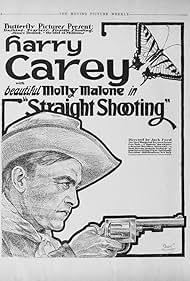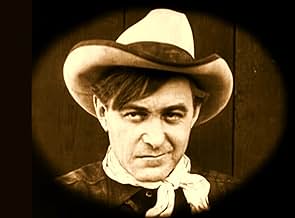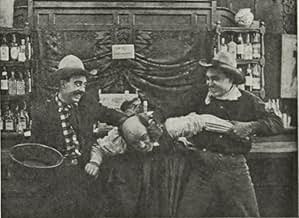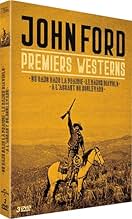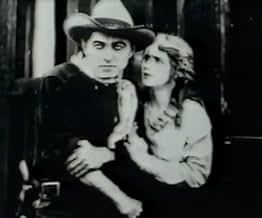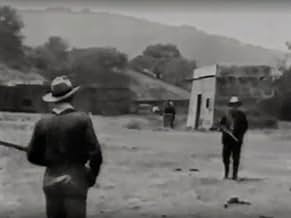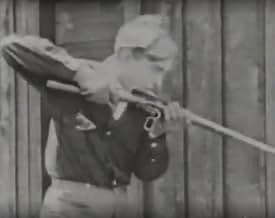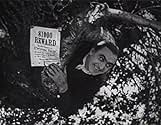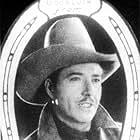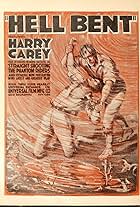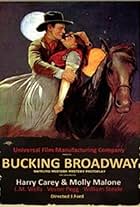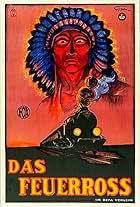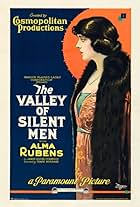Füge eine Handlung in deiner Sprache hinzuCattleman Flint cuts off farmer Sims' water supply. When Sims' son Ted goes for water, one of Flint's men kills him. Cheyenne is sent to finish off Sims, but finding the family at the newly ... Alles lesenCattleman Flint cuts off farmer Sims' water supply. When Sims' son Ted goes for water, one of Flint's men kills him. Cheyenne is sent to finish off Sims, but finding the family at the newly dug grave, he changes sides.Cattleman Flint cuts off farmer Sims' water supply. When Sims' son Ted goes for water, one of Flint's men kills him. Cheyenne is sent to finish off Sims, but finding the family at the newly dug grave, he changes sides.
Duke R. Lee
- Thunder Flint
- (as Duke Lee)
Milton Brown
- Black-Eye Pete
- (as Milt Brown)
William Steele
- Sheriff Connors
- (as William Gettinger)
Handlung
WUSSTEST DU SCHON:
- WissenswertesThis is believed to be John Ford's first feature film.
- Alternative VersionenIn 1925 a two-reel version was released with the title Straight Shootin'.
- VerbindungenFeatured in Directed by John Ford (1971)
Ausgewählte Rezension
Truly wonderful as many (most?) silent films are, there are unquestionably some qualities of the era that may may make them difficult to abide for some modern viewers. The older the picture, the more one can observe such idiosyncrasies. Chief among these are a very strictly regimented plot development, and discrete divisions between shots and scenes, leading to a somewhat stilted flow to the feature and a heightened awareness that the course of events is staged (i.e., suspension of disbelief somewhat takes a knock). While it's no fault of the cast, it's also worth noting that there's sometimes such a startling lack of diversity among the assembled actors that, especially for lack of verbal dialogue, characters might be all but entirely indistinguishable from one another, lending to easy confusion about what is happening in a scene. By all means, such movies can be worthy of their own accord, and entertaining, but I can get why they don't appeal to all. I'd have said the same of myself, once, and even still it's not as easy to engage with titles of this kin - and 'Straight shooting' is certainly characterized by such peculiarities to one extent or another.
If one can overlook such matters, there's nonetheless a fair bit to enjoy here. Though limited by the basic nature of how films were made in the 1910s, I think the cast do well with what they're given; at some points the acting is rather impressive, not least in light of the need for body language and facial expression alone to carry the day. The visual presentation is quite fine, including sets, costume design, stunts, and those effects that are employed. John Ford's direction seems capable, with the execution of some moments coming off particularly well, and the core of George Hively's story is duly compelling. It's perhaps nothing remarkable standing next to all this feature's many brethren, but it's a swell tale all the same, ripe for cinematic storytelling.
The value herein is troubled by those facets suggested above, and also a small tinge less focus in the narrative than would be desirable. The more 'Straight shooting' steps to the side from the central thread of villainous ranchers antagonizing earnest farmers, the more one is given pause while watching. The ending sadly feels overdone, for example. Above all I think of the sequence in the first half of the picture, around twelve minutes all told, in which a number of characters all find themselves in the same hotel/bar. Nowhere is the problem of the casting more evident as it's hard to discern who characters are, or what they're actually doing, and this scene doesn't even seem notably crucial to the plot.
Even at that, more so than not this is well made, and fairly fun such as it is. The climax is surely the highlight, that part of the movie that I'd be most likely to point to as an illustration of its worth. The story is reasonably engrossing, and everyone involved clearly put in hard work to make this the picture that it is. A bit more mindfulness would have helped this to meet greater success and stand out more, but it's decent enough as it is - and anyway, what it comes down to is that the faults of 'Straight shooting' are mostly issues that were common to productions in the silent era in the first place. Ultimately this falls rather short of being essential, and anyone who isn't already enamored of early cinema won't find anything here to change their mind. If you're looking for something light, though, something to watch as passing entertainment, it just might be what you're looking for.
If one can overlook such matters, there's nonetheless a fair bit to enjoy here. Though limited by the basic nature of how films were made in the 1910s, I think the cast do well with what they're given; at some points the acting is rather impressive, not least in light of the need for body language and facial expression alone to carry the day. The visual presentation is quite fine, including sets, costume design, stunts, and those effects that are employed. John Ford's direction seems capable, with the execution of some moments coming off particularly well, and the core of George Hively's story is duly compelling. It's perhaps nothing remarkable standing next to all this feature's many brethren, but it's a swell tale all the same, ripe for cinematic storytelling.
The value herein is troubled by those facets suggested above, and also a small tinge less focus in the narrative than would be desirable. The more 'Straight shooting' steps to the side from the central thread of villainous ranchers antagonizing earnest farmers, the more one is given pause while watching. The ending sadly feels overdone, for example. Above all I think of the sequence in the first half of the picture, around twelve minutes all told, in which a number of characters all find themselves in the same hotel/bar. Nowhere is the problem of the casting more evident as it's hard to discern who characters are, or what they're actually doing, and this scene doesn't even seem notably crucial to the plot.
Even at that, more so than not this is well made, and fairly fun such as it is. The climax is surely the highlight, that part of the movie that I'd be most likely to point to as an illustration of its worth. The story is reasonably engrossing, and everyone involved clearly put in hard work to make this the picture that it is. A bit more mindfulness would have helped this to meet greater success and stand out more, but it's decent enough as it is - and anyway, what it comes down to is that the faults of 'Straight shooting' are mostly issues that were common to productions in the silent era in the first place. Ultimately this falls rather short of being essential, and anyone who isn't already enamored of early cinema won't find anything here to change their mind. If you're looking for something light, though, something to watch as passing entertainment, it just might be what you're looking for.
- I_Ailurophile
- 7. Nov. 2022
- Permalink
Top-Auswahl
Melde dich zum Bewerten an und greife auf die Watchlist für personalisierte Empfehlungen zu.
Details
- Laufzeit1 Stunde 2 Minuten
- Sound-Mix
- Seitenverhältnis
- 1.33 : 1
Zu dieser Seite beitragen
Bearbeitung vorschlagen oder fehlenden Inhalt hinzufügen

Oberste Lücke
By what name was Straight Shooting (1917) officially released in India in English?
Antwort